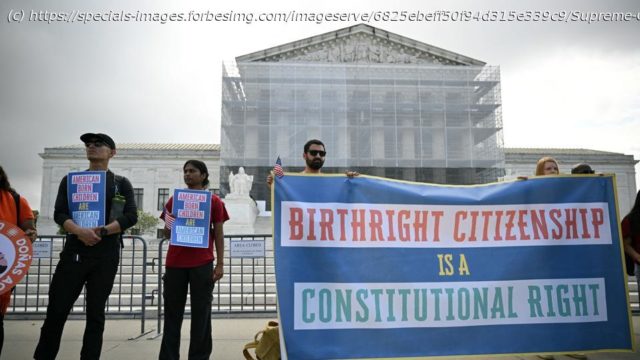The case, while about birthright citizenship, has significant implications for how Trump’s policies can be challenged in court.
Key Facts
The Supreme Court heard oral arguments in a group of consolidated lawsuits challenging Trump’s birthright citizenship order, which rescinds birthright citizenship for children born in the U.S. if their parents are not citizens or permanent U.S. residents and, critics argue, clearly violates the 14th Amendment granting citizenship to “all persons born or naturalized in the United States, and subject to the jurisdiction thereof.”
The court also more broadly considered nationwide injunctions that allow judges in a single court to block policies nationwide, as judges have used those injunctions to unilaterally block numerous Trump administration policies since the president took office.
No justice explicitly supported the Trump administration’s claims that birthright citizenship can be restricted, with Justice Sonia Sotomayor arguing the president’s order violates the “plain meaning” of the Constitution and Justice Elena Kagan noting “every court is ruling against” the Trump administration on the issue and arguing that any individual who brings a case against the order is “going to win.”
Multiple justices also brought up issues that could transpire should birthright citizenship be blocked in some states but not others, and Justice Ketanji Brown Jackson said outlawing nationwide injunctions could create a “catch-me-if-you-can” scenario in which the Trump administration could implement policies that are blatantly unlawful, but keep enforcing them “until everyone who is potentially harmed by it figures out how to file a lawsuit [or] hire a lawyer.”
Justices seemed skeptical of both totally allowing or totally opposing nationwide injunctions, raising possibilities like class-action lawsuits as ways that plaintiffs could get around needing a nationwide injunction while also acknowledging the issues with banning the practice entirely, with conservative-leaning Justice Clarence Thomas asking whether the “pragmatic considerations and policy considerations” of needing some policies to be blocked nationwide should “override” his concerns that nationwide injunctions weren’t used so often until relatively recently.






